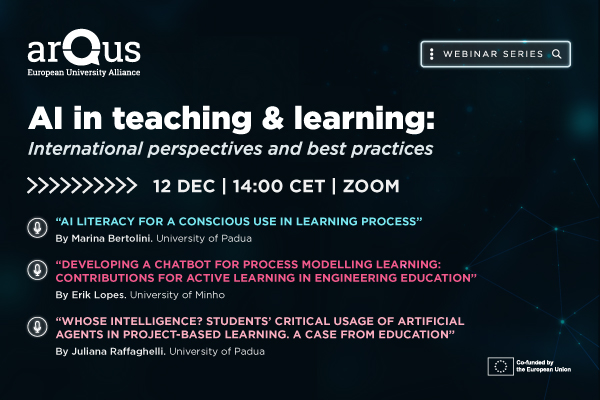
Second webinar of the Arqus “AI in teaching & learning: International perspectives and best practices” workshop series

Type: Arqus, Artificial Intelligence
Format: Online
Open to: Academics & researchers, Teachers
Artificial intelligence is changing university teaching – but how can it be used effectively? In this series of online workshops, experts from Arqus universities share their experiences and challenges in using AI in teaching. The second session of the series will take place on 12 December at 14:00 CET on Zoom.
The “AI in Teaching & Learning: International Perspectives and Best Practices” workshops consist of 90-minute online sessions, in which experts from European universities will share insights into the use of AI-supported applications and present best practices. This workshop series will aim to explore and discuss both the opportunities and challenges that AI brings to the future of teaching.
The second session will feature three talks on three different topics:
“AI literacy for a conscious use in the learning process”, by Marina Bertolini (University of Padua):
The spread of chatbots and other artificial intelligence tools has greatly influenced the way students approach courses and seek help in studying various subjects. Similarly, activities such as assignments, homework and active learning are now carried out differently than before. The literacy approach aims to encourage students from the very beginning to reflect and have an open discussion about how AI tools integrate with the learning activities of each course.
“Developing a Chatbot for Process Modelling Learning: contributions for active learning in engineering education”, by Erik Lopes (University of Minho).
This presentation outlines the development and implementation of a generative AI chatbot designed to support learning in process modelling and BPMN. Created using low-code tools, the chatbot was tested with students and professionals to assess its ability to simulate real interactions, enhance engagement, and reduce teaching workload. The discussion highlights its development process, user feedback, limitations, and future opportunities in higher education.
“Whose intelligence? Students’ critical usage of artificial agents in project-based learning. A case from Education”, by Juliana Raffaghelli (University of Padua).
This case presents a teaching practice designed to foster students’ critical and creative engagement with generative artificial intelligence (Gen-AI) within project-based learning. Implemented in the Bachelor’s Programme in Education at the University of Padua (2023–2025), the activity invited 23 students (2023), 12 students (2024) and 15 students (2025) to explore how AI tools can support the design of assessment instruments and evaluation interventions in education while raising ethical and professional questions. Through guided prompting, collaborative debates on academic integrity and privacy, and co-creation of materials using AI systems, students learned to recognise both the potential and the limitations of artificial agents. The practice enabled a shift from initial enthusiasm to reflective critique, nurturing awareness of bias, transparency, and epistemic justice. Positioned within the broader debate on “learning with and about AI,” this case illustrates how higher education can cultivate future educators’ autonomy, ethical sensitivity, and capacity to navigate intelligent technologies in meaningful ways.
All sessions will be held in English and are aimed at teachers, teaching support staff, and didactic experts at Arqus universities.
Participation is free of charge, but registration is required.